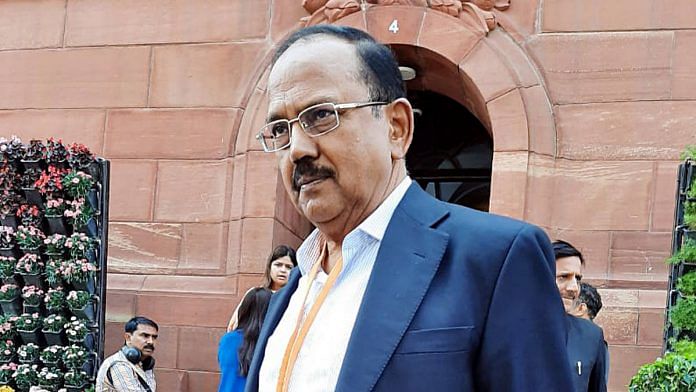New Delhi: National Security Advisor (NSA) Ajit Doval and his Afghan counterpart Hamdullah Mohib are expected to discuss the “next steps” in the stalled intra-Afghan dialogue, ThePrint has learnt.
The move comes ahead of the visit of Afghanistan President Ashraf Ghani and the chairman of the country’s High Council for National Reconciliation Abdullah Abdullah to the US Friday.
Doval and Mohib are likely to meet on the sidelines of the two-day meeting for all NSAs of the Shanghai Cooperation Organisation (SCO) in Tajikistan capital Dushanbe, top sources told ThePrint. The meeting began Wednesday.
Both NSAs are expected to discuss the role that India is “planning” to play in Afghanistan after the departure of the US troops by 11 September, amid a significant spike in Taliban’s offensive in the last few months that has claimed key cities in northern Afghanistan.
According to the highly-placed sources, both NSAs are also expected to discuss how India will be engaging with the Taliban leaders while it remains firm on its stance of supporting an Afghan-led, Afghan-owned and Afghan-controlled peace process.
The meeting between the two NSAs comes at a time when India is believed to have begun direct talks with the Taliban leaders as their chances of coming into power in Afghanistan become imminent.
Also read: Terrorist sanctuaries must be dismantled for enduring peace in Afghanistan, says Jaishankar
The Taliban meeting
According to Mutlaq bin Majed al-Qahtani, Qatar’s special envoy for counter-terrorism and conflict resolution, key Indian officials are believed to have undertaken a visit to the Qatari capital of Doha.
“I understand that there has been a quiet visit by Indian officials… to speak with the Talibans. Why? Because not everybody is believing that the Taliban will dominate and take over, because Taliban is a key component of, or should be, or is going to be, a key component of the future of Afghanistan,” said al-Qahtani, Qatar’s special envoy for counter-terrorism and conflict resolution, while addressing a virtual seminar Monday.
“I see the reason behind having a dialogue or talks or reaching out to all parties in Afghanistan but it is important to keep in mind that we are in a critical stage at this time, and I think if any meeting is going to take place, it should be for a major or main reason, which is to encourage the parties to solve their differences by peaceful means,” al-Qahtani said.
The Indian government has not confirmed the remarks by al-Qahtani yet.
However, according to the sources, India “more or less” began engaging with the Taliban directly when it participated in the first round of intra-Afghan dialogue that began in Doha in September 2020.
Also read: Will China reduce troops along LAC as promised, that’s the issue, says Jaishankar
Call for ‘permanent ceasefire’
The long-awaited intra-Aghan dialogue began last year with the aim of establishing a power-sharing deal between the elected Afghan government and the Taliban leaders once NATO troops exit the war-torn country and ending the 19-year long conflict.
During his recent visits to Kuwait and Kenya earlier this month, External Affairs Minister S. Jaishankar also made a point to visit Doha, where he met US Special Representative for Afghanistan Reconciliation Zalmay Khalilzad.
Met with @US4AfghanPeace Zalmay Khalilzad in Doha. Continued our exchange of perspectives on Afghanistan and the region. pic.twitter.com/LeFMzxjj2y
— Dr. S. Jaishankar (@DrSJaishankar) June 15, 2021
On Tuesday, Jaishankar urged the UN Security Council to press for a permanent and comprehensive ceasefire in Afghanistan.
“The intra-Afghan talks have not resulted in a reduction of violence in Afghanistan. On the contrary, violence has only increased, especially after 1st May… it is therefore crucial that the international community and, in particular, this Council presses for a permanent and comprehensive ceasefire to ensure immediate reduction in violence and protection of civilian lives,” he said.
The SCO meeting
The two-day conference in Dushanbe will also see participation from the NSAs of China, Pakistan, Russia, Kazakhstan, Kyrgyzstan, Tajikistan and Uzbekistan.
Sources also said the SCO NSAs meet may also settle the recent imbroglio surrounding Mohib’s “brothel house” remark, after which Pakistan decided to bypass him in Afghan talks.
Later this week, Afghan President Ghani and their key peace and reconciliation leader Abdullah will be meeting US President Joe Biden as they have been invited at the White House Friday.
The meeting is expected to discuss “the enduring partnership between the United States and Afghanistan as the military drawdown continues”, according to a White House statement.
Also read: UNSC must be made more representative of developing countries, says Harsh Shringla



